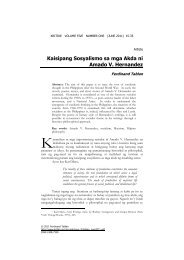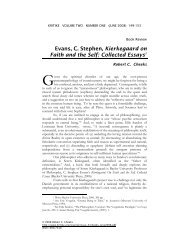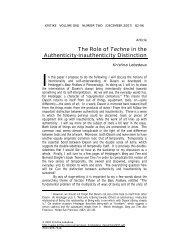Against Alienation: Karol Wojtyla's Theory of Participation
Against Alienation: Karol Wojtyla's Theory of Participation
Against Alienation: Karol Wojtyla's Theory of Participation
You also want an ePaper? Increase the reach of your titles
YUMPU automatically turns print PDFs into web optimized ePapers that Google loves.
78 AGAINST ALIENATION<br />
As much as these two systems are opposed to one another, their<br />
weakness is found in their false understanding <strong>of</strong> the human person. Both<br />
systems alienate the person from his ability to enter into a community <strong>of</strong><br />
persons as well as to fulfill himself in his actions. Wojtyla describes both<br />
systems to be “impersonalistic” or “antipersonalistic.” Both systems deny the<br />
capability <strong>of</strong> the person to enter into a community. Wojtyla argues that man<br />
has the right, even within a community to total freedom <strong>of</strong> acting. A person<br />
still has the freedom to determine himself towards his goals even as he is part<br />
<strong>of</strong> a community. This freedom <strong>of</strong> action within a community is not to be<br />
understood as absolute freedom but rather, as conditioned by the truth and the<br />
good.<br />
Individualism says that the common good is a threat to oneself while<br />
totalism says that any individual good is a threat to the common good. The<br />
concept <strong>of</strong> person in alienation denies the capability <strong>of</strong> the person to enter a<br />
community where he can experience himself existing and acting together with<br />
others towards a common good. The real common good is something that<br />
fulfills or creates opportunities to fulfill himself as well as the community.<br />
<strong>Alienation</strong> denies the person <strong>of</strong> the ability to transcend and fulfill himself in his<br />
action because it limits the kinds <strong>of</strong> relationships he can form. In both systems<br />
<strong>of</strong> individualism and totalism, persons are compromised and are denied <strong>of</strong> their<br />
ability to fulfill themselves in their actions.<br />
In alienation, the person is denied <strong>of</strong> his natural right and ability to<br />
participate. Wojtyla insists that that ability to participate must be cultivated and<br />
developed to its fullest maturity. 25 <strong>Alienation</strong> restricts the person in the sense<br />
that he is not allowed to maximize everything in his ability to fully experience<br />
himself as a person. <strong>Alienation</strong> is un-natural to the person because it goes<br />
against his natural ability to associate and relate with other persons. The<br />
experience <strong>of</strong> existing and acting together with others is not only something<br />
which should be kept because <strong>of</strong> nature. It also goes with the necessity for a<br />
person to fulfill himself, which always possible on the experience <strong>of</strong> a<br />
community. If a person is denied <strong>of</strong> those which are naturally his, then it is as<br />
if his freedom to determine himself towards his end is taken away from him.<br />
Every human being (must) have the right to act, which means “freedom in<br />
action,” so that the person can fulfill himself in performing the action. 26 This<br />
natural right to be free to determine oneself is based on the reality <strong>of</strong> actions<br />
possessing a personalistic value ins<strong>of</strong>ar as they fulfill the person. Man’s<br />
exercise <strong>of</strong> freedom in his self-determined actions brings him personal<br />
fulfillment. It is important to note that personal fulfillment does not occur<br />
with mere performance <strong>of</strong> actions but can only be found in the performance <strong>of</strong><br />
good actions hence, good actions fulfill and those which do not fulfill, are<br />
called evil. <strong>Alienation</strong>, which denies the person his ability to fulfill himself is<br />
ultimately an evil in society – both to the person and the community <strong>of</strong><br />
25 Francisco, op cit., 79.<br />
26 Wojtyla, The Acting Person, 275.

















